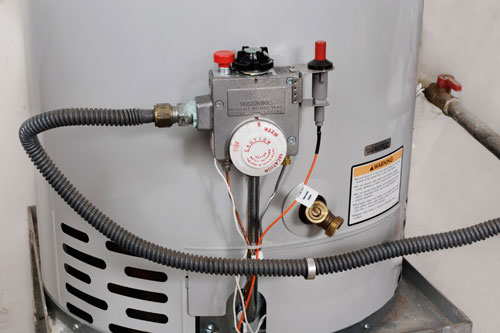Gas hot water heater troubleshooting involves checking the pilot light, gas valve, igniter, thermal switch, baffle, wiring, and thermal pilot voltage. If the pilot light is not lit, the gas valve may be faulty and need replacement.
Additionally, a gas leak can cause the heater to stop working, in which case the gas company should be immediately contacted. Water leaks and temperature problems are other common issues with gas water heaters. If the water heater is not heating properly, possible causes include a defective igniter, faulty gas valve, or improper pilot temperature.
It is also important to check the pressure switch and perform a visual inspection of the heater.
Effective Gas Water Heater Troubleshooting
When it comes to ensuring a consistent supply of hot water in your home, a gas water heater plays a crucial role. However, like any appliance, gas water heaters can experience issues that can disrupt their performance. To avoid cold showers or inconvenient water temperature variations, it’s important to understand how to troubleshoot common problems that may arise.
Understanding Your Gas Water Heater’s Anatomy
Before diving into troubleshooting, it’s essential to familiarize yourself with the anatomy of a gas water heater. By understanding the different components, you’ll be better equipped to identify and resolve any potential issues.
| Component | Description |
|---|---|
| Gas Valve | Controls the flow of gas into the burner assembly |
| Thermostat | Regulates the water temperature |
| Igniter | Ignites the burner and starts the heating process |
| Thermocouple | Senses the presence of a pilot flame to prevent gas leaks |
| Burner Assembly | Produces the heat needed to warm the water |
Identifying Common Signs Of Trouble
Now that you’re familiar with the gas water heater’s anatomy, let’s discuss some common signs of trouble that you should keep an eye out for:
- No hot water: A lack of hot water can indicate various issues, such as a faulty gas connection, a bad pilot light, or a malfunctioning burner.
- Inconsistent temperature: If your water heater is unable to maintain a consistent temperature, it could be a sign of a malfunctioning thermostat or a problem with the gas valve.
- Pilot light won’t stay lit: If the pilot light keeps going out, it could be due to a dirty pilot assembly or a faulty thermocouple.
- Water leaks: Water leaks can be caused by corrosion or fractures in the tank. Ensure that the leak is not coming from any other source before assuming it’s a tank issue.
When faced with any of these issues, it’s important to take immediate action to prevent further complications and to restore your gas water heater’s functionality. Don’t hesitate to perform the necessary troubleshooting steps or seek professional assistance if needed.
Diagnosing No Hot Water Issues
Experiencing a lack of hot water can be frustrating, especially during the cold winter months. However, diagnosing the issue is the first step towards finding a solution. In this article, we will guide you through the process of troubleshooting your gas hot water heater when it’s not producing hot water. By following these steps, you can identify the root cause of the problem and potentially resolve it yourself before calling a professional.
Checking The Pilot Light And Ignition System
One of the most common reasons for a gas hot water heater not producing hot water is a faulty pilot light or ignition system. To check the pilot light, start by locating the access panel on the front of the water heater. Remove the panel and visually inspect the area. If the pilot light is out, you can attempt to relight it following the manufacturer’s instructions. If the pilot light won’t stay lit or relighting it doesn’t solve the issue, a deeper inspection of the ignition system may be required.
Inspecting The Gas Supply And Valve Operation
Another potential cause of no hot water is an issue with the gas supply or the operation of the gas valve. Begin by ensuring that the gas supply to the water heater is turned on and that the gas valve is fully open. If you suspect a problem with the gas valve, you can use a wrench to turn it off and on a few times to check for any blockages or obstructions. It’s important to exercise caution when working with gas, so if you’re unsure, it’s best to consult a professional.
Assessing The Thermocouple’s Condition
The thermocouple is a safety device that senses the pilot flame and allows the gas valve to stay open. If the thermocouple is faulty or damaged, it may not signal the gas valve to open, resulting in no hot water. To assess the thermocouple’s condition, visually inspect it for any signs of corrosion or damage. If necessary, you can use a multimeter to test its functionality. If the thermocouple is indeed faulty, it will need to be replaced.
By following these troubleshooting steps, you can diagnose and potentially resolve the issue of no hot water in your gas hot water heater. However, if you’re unsure or uncomfortable performing these tasks yourself, it’s always recommended to seek professional assistance to ensure the safety and proper functioning of your water heater.
Resolving Water Heating Inconsistencies
Experiencing inconsistencies with your gas hot water heater? Troubleshoot common issues like pilot light problems, gas valve malfunctions, and low water temperature to get your hot water flowing again.
Troubleshooting Thermostat Complications
If your gas hot water heater is experiencing inconsistent water heating, one potential culprit could be thermostat complications. The thermostat is responsible for regulating the temperature of the water, ensuring it reaches the desired hotness. However, over time, thermostats may develop issues that prevent them from functioning properly. To troubleshoot thermostat complications, start by adjusting the temperature setting on the thermostat. It’s possible that the current setting is too low, causing the water to not heat up adequately. Increase the temperature by a few degrees and observe if the issue persists. If adjusting the temperature doesn’t solve the problem, the next step is to check the electrical connections to the thermostat. Make sure all wires are securely connected and free from any damage or corrosion. If any issues are found, it may be necessary to replace the thermostat or seek professional assistance.Evaluating The Heating Element And Burner Assembly
Another common cause of water heating inconsistencies in gas hot water heaters is a malfunctioning heating element or burner assembly. When these components fail, it can lead to reduced heat production or total loss of hot water. To evaluate the heating element, start by turning off the gas supply and disconnecting the power to the water heater. Carefully remove the access panel to gain access to the heating element. Inspect the element for signs of damage or corrosion. If any issues are found, it may be necessary to replace the heating element. Similarly, the burner assembly should be checked for any obstructions or debris that may be preventing proper combustion. Remove any buildup or blockages and ensure that the burner components are clean and in good condition. In some cases, a faulty burner assembly may require professional intervention to restore proper functioning.Addressing Sediment Buildup And Water Pressure
Sediment buildup and water pressure issues can also contribute to inconsistent hot water production in gas hot water heaters. Over time, mineral deposits can accumulate within the tank, reducing its efficiency and affecting water heating capabilities. Additionally, low water pressure can prevent the heater from adequately supplying hot water. To address sediment buildup, consider flushing the tank periodically to remove any accumulated debris. Consult the manufacturer’s instructions or seek professional guidance on the proper flushing procedure for your specific gas hot water heater model. Furthermore, check the water pressure coming into the heater. Low water pressure can be caused by various factors, including clogged pipes or issues with the water supply. Ensure that the water pressure to the heater meets the recommended levels stated by the manufacturer. By troubleshooting thermostat complications, evaluating the heating element and burner assembly, and addressing sediment buildup and water pressure issues, you can resolve water heating inconsistencies in your gas hot water heater effectively. Remember to exercise caution and consult professional help when in doubt or if the issue persists.+Gas Hot Water Heater Leaks
Gas hot water heater leaks are a common issue when troubleshooting gas hot water heaters. Leaks can occur due to tank corrosion, creating cracks or fractures. It’s important to address these leaks promptly to prevent further damage and ensure hot water availability.
Identifying Leak Locations And Their Causes
Leak location
Gas hot water heater leaks can occur in various locations within the system. Identifying the specific location of the leak is crucial for effective troubleshooting.
Cause of leaks
There are several potential causes for gas hot water heater leaks:
- Corroded tank: Over time, water can corrode the tank of your hot water heater, resulting in small cracks or fractures. This can lead to leaks.
- Loose or damaged fittings: If the fittings connecting the water supply lines to the heater are loose or damaged, they can cause water to leak.
- Pressure relief valve issues: A malfunctioning pressure relief valve can cause water to leak out of the heater.
- Condensation: Sometimes, what may seem like a leak is actually condensation. Check for moisture around the base of the heater to determine if condensation is the issue.
- Excessive pressure: High water pressure can put stress on the heater, leading to leaks. Ensure that the pressure is within the recommended range.
- Cracked or damaged pipes: Any cracked or damaged pipes connected to the heater can also result in leaks.
Gas Hot Water Heater Troubleshooting: Sealing And Replacement Solutions
Sealing solutions
If the leak is due to loose or damaged fittings, applying sealant or tightening the connections can help resolve the issue. It is important to ensure that the fittings are properly sealed to prevent any further leaks.
Replacement solutions
In cases where the tank is corroded or the pressure relief valve is faulty, replacement may be necessary. It is recommended to consult a professional plumber to determine the best course of action and ensure a safe and effective replacement.
Maintenance Tips For Longevity
Ensure the longevity of your gas hot water heater with these troubleshooting tips. Learn how to inspect and relight the pilot flame, check the gas valve and igniter, reset the thermal switch, and inspect the baffle and wiring. Test the thermal pilot voltage and resolve common issues to keep your hot water flowing efficiently.
Regular cleaning and inspection routines Regular cleaning and inspection routines are essential to ensuring the longevity and efficient performance of your gas hot water heater. By implementing a few simple maintenance habits, you can extend the lifespan of your unit and prevent any major issues from occurring. Here are some key steps to include in your regular cleaning and inspection routine: 1. Drain and flush the tank: Over time, sediments and mineral deposits can build up inside the tank, reducing its efficiency and potentially causing damage. To prevent this, drain and flush the tank regularly. Simply connect a hose to the drain valve and let the water flow out until it runs clear. This will help remove any debris and ensure optimal performance. 2. Check the pressure relief valve: The pressure relief valve is a crucial safety feature of your hot water heater. It helps to release excess pressure and prevent the tank from bursting. Make sure to test the valve annually by lifting the lever and allowing some water to flow out. If the valve doesn’t operate properly, it may need to be replaced. 3. Inspect the burner and flame: A clean and properly functioning burner is essential for efficient heating. Regularly inspect the burner and flame to ensure they are both clean and blue. If the flame is yellow or irregular, it may indicate a problem with the burner or gas supply. In such cases, it is best to seek professional help. 4. Insulate the tank and pipes: Insulating the tank and pipes can help reduce heat loss and improve energy efficiency. You can use specialized insulation materials or simply wrap the tank and pipes with insulating blankets. This will help retain the heat and reduce the workload on your hot water heater. When to seek professional help While regular maintenance can go a long way in preventing issues, some problems may require professional assistance. If you notice any of the following signs, it is advisable to seek the help of a qualified technician: 1. No hot water: If your hot water heater stops producing hot water altogether, it may indicate a faulty heating element, gas valve, or thermocouple. A professional can diagnose and fix the issue to restore hot water in your home. 2. Leaks: Water leaks around your hot water heater can be a sign of a serious problem. It could indicate a crack in the tank or a faulty valve. These issues should be addressed immediately to prevent further damage and potential flooding. 3. Strange noises: Unusual noises such as rumbling, popping, or hissing coming from your hot water heater may indicate sediment buildup or a malfunctioning component. A professional can inspect and clean the tank to resolve the issue. Remember, proper maintenance and timely repairs play a crucial role in extending the lifespan of your gas hot water heater. By following these maintenance tips and knowing when to seek professional help, you can ensure that your hot water heater operates efficiently and provides reliable hot water for years to come.
Credit: www.austingsmechanical.com
Frequently Asked Questions On Gas Hot Water Heater Troubleshooting
What Is The Most Common Problem With A Gas Water Heater?
The most common problem with a gas water heater is water leaks. Over time, water can corrode the tank and create microscopic cracks or fractures, leading to leaks. However, not all leaks mean that the tank itself is leaking.
Why Is My Gas Water Heater Not Getting Hot Water?
A lack of hot water in a gas water heater can be caused by various issues such as a faulty gas connection, a bad pilot light, or a bad burner. Check for gas leaks and ensure the gas valve is functioning properly.
Why Would Gas Hot Water Heater Suddenly Stop Working?
Common causes for a gas hot water heater suddenly stopping working include a gas leak or a faulty gas valve. If you smell gas, turn off the power and contact your gas company. Additionally, the water heater may need a reset or have issues with the pilot light, burner, or heating element.
Is There A Reset Button On A Gas Hot Water Heater?
Yes, there is a reset button on a gas hot water heater. It can be used to reset the heater if it is not working properly.
Conclusion
If you’re facing issues with your gas hot water heater, troubleshooting can help you identify and resolve the problem. From checking the pilot flame to inspecting the gas valve and igniter, there are several steps you can take to troubleshoot your water heater.
Additionally, issues like a faulty thermocouple or a gas leak can also cause hot water heater problems. By following these troubleshooting steps, you can get your gas hot water heater back up and running efficiently. Remember, if you’re unsure or smell gas, it’s best to call a professional for assistance.

I am a Water Heater specialist writer and blogger based in the USA & UK. I have been working with Water Heater for six long years. And I give trips on various Water Heater problems and solutions. I have a lot of experience with Water Heater And I share them here

